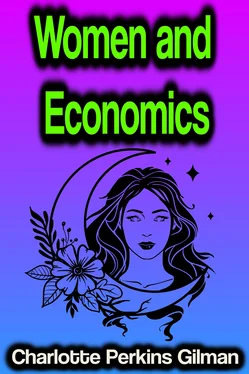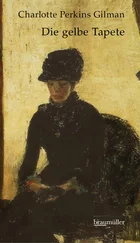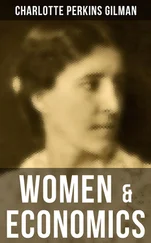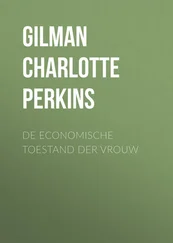Followed in specific detail, the action of the changed environment upon women has been in given instances as follows: In the matter of mere passive surroundings she has been immediately restricted in her range. This one factor has an immense effect on man and animal alike. An absolutely uniform environment, one shape, one size, one color, one sound, would render life, if any life could be, one helpless, changeless thing. As the environment increases and varies, the development of the creature must increase and vary with it; for he acquires knowledge and power, as the material for knowledge and the need for power appear. In migratory species the female is free to acquire the same knowledge as the male by the same means, the same development by the same experiences. The human female has been restricted in range from the earliest beginning. Even among savages, she has a much more restricted knowledge of the land she lives in. She moves with the camp, of course, and follows her primitive industries in its vicinity; but the war-path and the hunt are the man's. He has a far larger habitat. The life of the female savage is freedom itself, however, compared with the increasing constriction of custom closing in upon the woman, as civilization advanced, like the iron torture chamber of romance. Its culmination is expressed in the proverb: "A woman should leave her home but three times,–when she is christened, when she is married, and when she is buried." Or this: "The woman, the cat, and the chimney should never leave the house." The absolutely stationary female and the wide-ranging male are distinctly human institutions, after we leave behind us such low forms of life as the gypsy moth, whose female seldom moves more than a few feet from the pupa moth. She has aborted wings, and cannot fly. She waits humbly for the winged male, lays her myriad eggs, and dies,–a fine instance of modification to sex.
To reduce so largely the mere area of environment is a great check to race-development; but it is not to be compared in its effects with the reduction in voluntary activity to which the human female has been subjected. Her restricted impression, her confinement to the four walls of the home, have done great execution, of course, in limiting her ideas, her information, her thought-processes, and power of judgment; and in giving a disproportionate prominence and intensity to the few things she knows about; but this is innocent in action compared with her restricted expression, the denial of freedom to act. A living organism is modified far less through the action of external circumstances upon it and its reaction thereto, than through the effect of its own exertions. Skin may be thickened gradually by exposure to the weather; but it is thickened far more quickly by being rubbed against something, as the handle of an oar or of a broom. To be surrounded by beautiful things has much influence upon the human creature; to make beautiful things has more. To live among beautiful surroundings and make ugly things is more directly lowering than to live among ugly surroundings and make beautiful things. What we do modifies us more than what is done to us. The freedom of expression has been more restricted in women than the freedom of impression, if that be possible. Something of the world she lived in she has seen from her barred windows. Some air has come through the purdah's folds, some knowledge has filtered to her eager ears from the talk of men. Desdemona learned somewhat of Othello. Had she known more, she might have lived longer. But in the ever-growing human impulse to create, the power and will to make, to do, to express one's spirit in new forms,–here she has been utterly debarred. She might work as she had worked from the beginning,–at the primitive labors of the household; but in the inevitable expansion of even those industries to professional levels we have striven to hold her back. To work with her own hands, for nothing, in direct body-service to her own family,–this has been permitted,–yes, compelled. But to be and do anything further from this she has been forbidden. Her labor has not only been limited in kind, but in degree. Whatever she has been allowed to do must be done in private and alone, the first-hand industries of savage times.
Our growth in industry has been not only in kind, but in class. The baker is not in the same industrial grade with the house-cook, though both make bread. To specialize any form of labor is a step up: to organize it is another step. Specialization and organization are the basis of human progress, the organic methods of social life. They have been forbidden to women almost absolutely. The greatest and most beneficent change of this century is the progress of women in these two lines of advance. The effect of this check in industrial development, accompanied as it was by the constant inheritance of increased racial power, has been to intensify the sensations and emotions of women, and to develope great activity in the lines allowed. The nervous energy that up to present memory his impelled women to labor incessantly at something, be it the veriest folly of fancy work, is one mark of this effect.
In religious development the same dead-line has held back the growth of women through all the races and ages. In dim early times she was sharer in the mysteries and rites; but, as religion developed, her place receded, until Paul commanded her to be silent in the churches. And she has been silent until to-day. Even now, with all the ground gained, we have but the beginnings–the slowly forced and disapproved beginnings–of religious equality for the sexes. In some nations, religion is held to be a masculine attribute exclusively, it being even questioned whether women have souls. An early Christian council settled that important decision by vote, fortunately deciding that they had. In a church whose main strength has always been derived from the adherence of women, it would have been an uncomfortable reflection not to have allowed them souls. Ancient family worship ran in the male line. It was the son who kept the sacred grandfathers in due respect, and poured libations to their shades. When the woman married, she changed her ancestors, and had to worship her husband's progenitors instead of her own. This is why the Hindu and the Chinaman and many others of like stamp must have a son to keep them in countenance,–a deep-seated sex-prejudice, coming to slow extinction as women rise in economic importance.
It is painfully interesting to trace the gradual cumulative effect of these conditions upon women: first, the action of large natural laws, acting on her as they would act on any other animal; then the evolution of social customs and laws (with her position as the active cause), following the direction of mere physical forces, and adding heavily to them; then, with increasing civilization, the unbroken accumulation of precedent, burnt into each generation by the growing force of education, made lovely by art, holy by religion, desirable by habit; and, steadily acting from beneath, the unswerving pressure of economic necessity upon which the whole structure rested. These are strong modifying conditions, indeed.
The process would have been even more effective and far less painful but for one important circumstance. Heredity has no Salic law. Each girl-child inherits from her father a certain increasing percentage of human development, human power, human tendency; and each boy as well inherits from his mother the increasing percentage of sex-development, sex-power, sex-tendency. The action of heredity has been to equalize what every tendency of environment and education made to differ. This has saved us from such a female as the gypsy moth. It has held up the woman, and held down the man. It has set iron bounds to our absurd effort to make a race with one sex a million years behind the other. But it has added terribly to the pain and difficulty of human life,–a difficulty and a pain that should have taught us long since that we were living on wrong lines. Each woman born, re-humanized by the current of race activity carried on by her father and re-womanized by her traditional position, has had to live over again in her own person the same process of restriction, repression, denial; the smothering "no" which crushed down all her human desires to create, to discover, to learn, to express, to advance. Each woman has had, on the other hand, the same single avenue of expression and attainment; the same one way in which alone she might do what she could, get what she might. All other doors were shut, and this one always open; and the whole pressure of advancing humanity was upon her. No wonder that young Daniel in the apocryphal tale proclaimed: "The king is strong! Wine is strong! But women are stronger!"
Читать дальше












